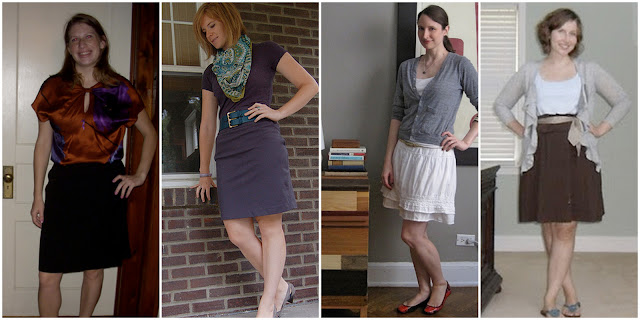Draft:
Earlier Drafts:
I sported this cardigan with my black shift.
I channeled Emma from Glee in this skirt. (New season starts tomorrow!)
This necklace was one of my few purchases this summer. (Regarding that post: I did
try to revisit
Camera Lucida, but someone either lost our library's copy or refuses to relinquish it, and ILL is too much of a pain.)
Composition:
hoop and bead earrings (gifted: thanks D!)
clear acrylic beaded necklace (Kohl's)
black tank (Target)
purple cardigan (NY&Co)
black and white print pencil skirt (NY&Co)
black leather flats (Nine West)
Usage:
Can you tell I took these photos in the evening? What gave it away? The bad lighting? My moderately disheveled appearance? The bad photo quality in which my head appears blurred, but which nicely approximates my fuzzy headspace after a long day of teaching and taking classes? Suffice it to say, it was one of those days where I was patting myself on the back for having chosen flats.
When I posted my
first day of school look, Brooke commented: "
I'm always so envious to read that you feel 'comfortable' in those types of clothes. I'd very much prefer to stand up and teach in gym clothes or jeans and a tee shirt. I always can't wait to get home and hop into my leggings and tees. Have you always felt comfortable dressed up, or did you adapt to it? I'm hoping I'll adapt soon!" I've got a lot to say in response to this great question, so here goes.
As I touched upon briefly in the comments to
this post, I think there are two components to the "comfort" I associate with an outfit, those being a) a type of psychological comfort, and b) a type of physical/bodily comfort. Most times, I think there's a large overlap between the two, because I tend to feel physically comfortable in things that make me feel psychologically comfortable and vice versa. Sometimes that's not the case, and for me, psychological comfort always trumps physical comfort. I find yoga pants to be very comfortably physically, but I rarely wear them outside the house because I regard them as pajamas, and I'm not psychologically comfortable wearing my pajamas in public.
So now that I've tried to clarify what I mean by "comfortable," I think I can address Brooke's question more directly. I did not always feel physically comfortable in professional attire. And, I think, I had to learn to take myself seriously as a professional before I felt psychologically comfortable in these clothes, as well. But life taught me to feel comfortable in these clothes, in both senses of the word. I started teaching high school at 22, and I was frequently mistaken for a student. I think this happened because I was fresh faced and because people think of my build as small. Being told I looked like a high schooler was maddening, and though some people suggested to me that I should "take it as a compliment," nobody ever said it in a complimentary tone. They said it in a tone of surprise and/or condescension. So I took offense.
I always wore what I felt were "grown up clothes" to teach. Unlike other teachers (young
and old), I didn't wear jeans, t-shirts, or hooded sweatshirts with the school's logo on them. However, that didn't seem to differentiate me adequately, so I made the conscious decision to dress more "business" than "business casual" while still retaining my own personal style. I rarely wore heels, because I stood in front of my students all day, but I invested in trousers to replace my khakis, cardigans to replace my cable knit sweaters, blouses to replace my polo shirts, pencil skirts, and wrap dresses. It didn't make a huge difference with my students; I think that because they spent so much time with me, they learned to respect my authority fairly quickly. However, it made an absolutely noticeable difference with my fellow teachers, the administrators, and especially the parents. The rude and inappropriate comments stopped almost entirely. The parents were more willing to listen to what I had to say. (They used to ask me how old I was so frequently that I finally resorted to this response every time: "Old enough to have completed the degree which qualifies me to teach your child.") My principal actually told me, "I used to think you didn't write referrals because you were a pushover, but I've realized that you don't write them because you address behavior problems adequately in your classroom." I think all of these changes were directly related to dress. These clothes say:
I mean business. I know what I'm doing. I have my s*** together. I take my work seriously. I am a disciplined person and I expect others to demonstrate self discipline, too. All of those things were true before, but my business casual clothes did a less effective job of communicating them.
As a result of this change, I began to feel more psychologically comfortable in these clothes.
Nothing angers me more than being underestimated, so when I realized that I could take concrete actions to disallow that kind of underestimation, it was like I had found the golden ticket. I've always been aesthetically attracted to clean lines, tailored silhouettes, crisp collars, pressed fabrics, and the like, so while the clothes didn't initially strike me as physically comfortable, the transition was a fairly seamless one. Now, these clothes feel more
me to me than more casual ones. I learned how to shop for clothes that fit these categories and were physically comfortable, too. This involved embracing stretch materials, trying on a thousand pairs of trousers until I found the perfect pair, and learning to buy the item that fit best instead of the one that said it should be my size. At this point, I actually don't understand why anyone thinks jeans are more comfortable than a perfectly fitting pair of trousers. (Pencil skirts, I'll admit are not ideal, but only because they tend to ride up when you're sitting down for an extended period of time, which I never do when I'm teaching.)
And this is making a long post even longer, but I've been giving a lot of thought to my MA defense episode since writing
this previous post about it. I can't help but wonder if, on some subconscious level, I dressed less professionally for that event because I didn't feel like I had earned it yet, so performing professionalism didn't feel quite right. This is stupid, because I certainly
had earned it, but it's also kind of predictable, because I've encountered much more self-doubt as a graduate student than I ever did as a high school classroom teacher.
In other words: I feel psychologically comfortable in these clothes because they make me feel like other people take me more seriously. Because I am invested in wearing clothes that facilitate that reaction, I'm committed to finding clothes which do so
and are physically comfortable. However, I don't think I could have worn them with any real confidence until I felt legitimately ready to take on the type of respect I would be afforded when dressed in them. And if you're still with me on this one, thanks for following along. One of the things I love most about this blog is that it gives me a space to think through these things in more depth. Thanks so much for the question, Brooke!
Related Posts:
Recently, A-Dubs shared her own frustration about being underestimated, in her case because of gendered and disciplinary assumptions, and she also responded by resolving to "up the profesh-factor."
Sara wrote an excellent post in which she interrogated the widespread assumption that dresses are necessarily "dressy" or atypical as daily wear.
(don't we have brilliant blogfriends?!)
Prompts:
- Do you also see "comfort" in dress as a combination of psychological and physical comfort? Does one trump the other for you, or are they equally important?
- Do you think I've pidgeon-holed myself too much by relying on "professional" clothes for psychological comfort? I'm starting to think I have, so I'm committed to learning to take myself seriously in more casual clothes, both IRL and here on the blog.
- Have you found that your style of dress has made a significant difference in the way people respond to you?
- Does it sound like I'm on a power trip? In the interest of full disclosure, I kind of am. As a young female, I find again and again that no one is going to take me seriously unless I demand it. Thoughts on this issue?



































